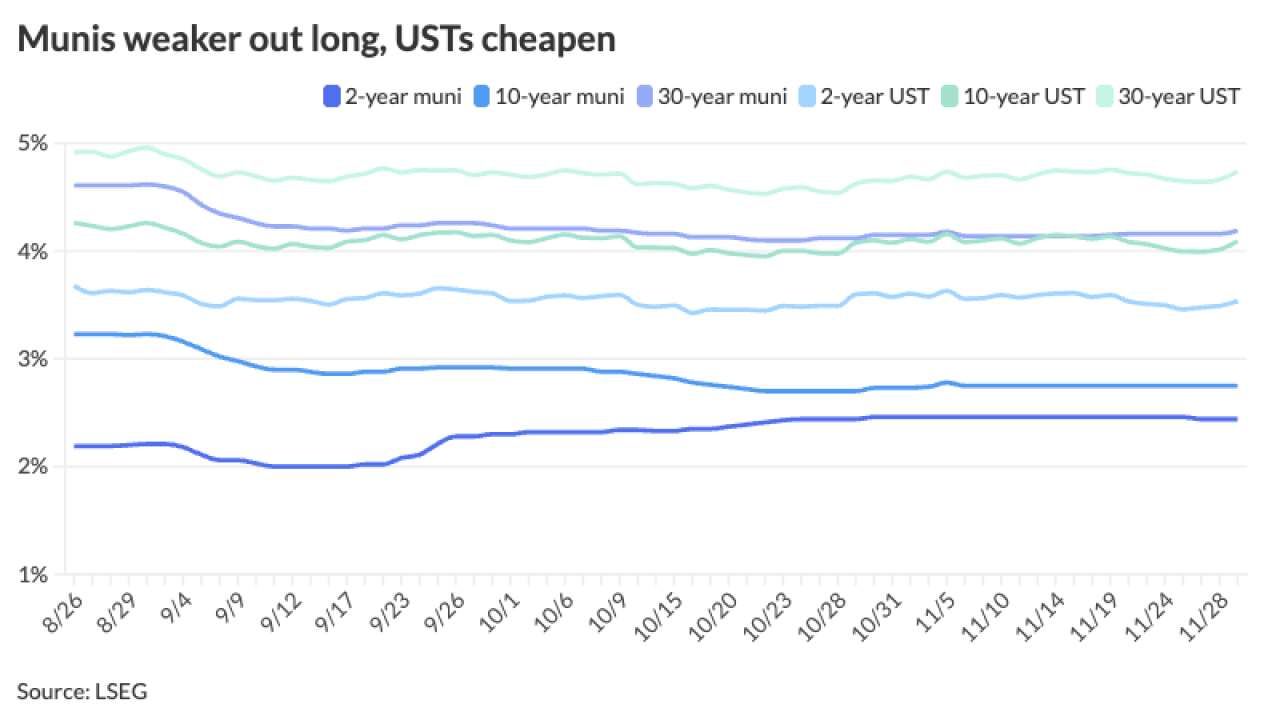
Veteran bondholders of Brightline Florida train bonds say they're in wait-and-see mode while the company attempts to secure equity and possibly float new debt after it deferred interest payments due Tuesday.
Some of the bonds have traded sharply lower since Friday, when the issue was reported.
The postponed payment does not formally constitute a default under bond documents, which allow the company the "option" of deferring three interest payments with a 2% step-up rate.
"It was a little unexpected that they chose to take advantage of the payment deferral option on the bonds," said Dora Lee, director of research at Belle Haven Investments, which holds Brightline debt, including some of the bonds with the deferred interest. "But the complete story isn't out there yet, so right now we're in a wait-and-see mode to see what [Brightline parent company] Fortress has to say."
Brightline Trains Florida LLC owns and operates a $6 billion, 235-mile train system from Miami to Orlando, dotted with stations in between, that marks the nation's only private passenger intercity express system.
A spokesperson said Monday that Brightline intends to "make the deferred interest payment with operating cash flow or proceeds from equity and debt financings that we are actively pursuing."
Separately, in a late
Meanwhile, the Florida Development Finance Corp. on Thursday is expected to hold a
"Potential uses of proceeds will include reimbursement for prior costs and project expansion, which may include construction of new stations and that could be subsequently reimbursed with other sources of funds," the EMMA notice said. "Net proceeds from reimbursements would be expected to fund increases in project reserve accounts and enhance cash flow."
Tuesday's postponed interest payment is the latest surprise for what's long been one of the high-yield muni market's largest and most volatile credits. Last year, the company restructured its large and complex capital stack in a borrowing that marked the largest private-activity bond issuance and
The deal lifted much of the company's speculative-rated bonds into the investment-grade category for the first time — a move that some investors say may have come too soon, and which one rating agency reversed in May.
Including the taxable debt, the financing restructured $4.5 billion of debt across three liens, with a mix of taxable and tax-exempt debt featuring subordinate and senior liens backed by newly separated holding, operating and parent company entities.
The deferred interest payments are for $1.2 billion of unrated subordinate 10% to 12% tax-exempt debt.
Jeff Timlin, a manager partner at Sage Advisory, which holds taxable Brightline bonds, said the firm will "keep an eye" on the issuer after it deferred the payment.
"It's never a good sign when an issuer has to delay interest payments, even though it's technically not in default," Timlin said.
The deferred payment has Timlin concerned that the same thing may happen to the firm's taxable bonds. "It's all intertwined. More of it's probably within the same pool of funds. That would put up some warning flags," he said.
Monday's EMMA notice also said the company is considering moving more debt from a taxable to a tax-exempt structure, which raises questions about upcoming borrowings.
"Will it be the HoldCo, the OpCo, the ParentCo?" asked Jim Lyman, Belle Haven's senior vice president of credit research. "Then you have to ask if anyone in the municipal market is willing to bail out the high-yield corporate market."
Some of the bonds have traded sharply lower, and pricing services have marked others down, after Bloomberg reported on Friday the deferred interest payment.
Roughly $16 million chunk of senior 5.25% bonds due in 2047 traded Friday for 82.5, down from 90 on July 1. The bonds traded at 79.5 Monday.
A $1 million trade on the senior 5% bonds due in 2034 rated BB-plus/negative traded Tuesday for 80.5, down from 102.75 in early March.
The
The EMMA notice also outlined June ridership and revenue projections, noting, monthly revenue of $16.9 million was up 11% year over year, driven by a 14% increase in long-distance ticket revenue, but offset by a 10% decrease in short-distance ticket revenue.
A bondholder who asked to remain anonymous said ridership growth has been constrained by the lack of new train cars.
"The management readily proclaimed they made a mistake with Orlando [in that] they did not order enough train cars," the holder said, noting that as of June 9, the company had placed five additional five passenger coaches into service. First-class cars will not be delivered until later this year, the investor said.
"It's really tough for the market to gauge what the true demand is until all the new train cars are delivered," the investor said.
The lack of new train cars that have limited ridership is "why they've gotten into this cash crunch and they've pulled this temporary lever of deferring interest to free up cash for other items," the investor said. "The most important thing over the next six months is raising this equity, improving their balance sheet and start paying down the debt."
Some bondholders said last year's investment-grade rating was too aggressive, and in May,
The investment-grade ratings may have attracted investors uncomfortable with volatility, Belle Haven's Lee said. "The bonds that came to market last year attracted more of a retail base that probably didn't have as much experience with the project as the investor base that was historically tracking Brightline," she said. The mom-and-pop buyers "haven't gone through the years of missed milestones and the various delays the project has had in the past."
Matt Fabian, a partner at Municipal Market Analytics, said in a Tuesday note that, like the recent downgrades, "this miss seems unlikely to catalyze a systemic investor rethinking of the credit, which more than typically depends on their confidence in long-term outcomes.
"However, that this default happened at all (meaning, that the project chose not to (or could not) borrow enough cash in time to avert the interest miss) is at odds with the idea of a highly supportive universe of lenders," he said. "To be sure, higher rates make project costs more painful, and expectations for rising rates going forward imply a need for permanent funding sooner vs. later."
The postponed payment is "unsurprising," said Steven Grey, founder and CIO of Grey Value Management, who does not own the bonds.
"They've got to raise ticket costs to increase the revenue. But the more they raise the ticket cost, the fewer passengers they get. And that's a problem that speaks to the economics of the original business plan," Grey said. "This could be a decent business for somebody who buys it after the restructuring, and a bunch of the debt is wiped out. But even so, it's fundamentally not profitable when it's running, or at least not profitable yet."





